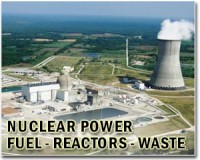 |
Vienna (AFP) June 7, 2010 Iran's controversial nuclear drive tops the agenda at a week-long meeting of the UN atomic watchdog starting here Monday as world powers are poised to slap new sanctions on Tehran. The International Atomic Energy Agency's 35-member board of governors was scheduled to convene at 10:30 am (0830 GMT) for a heavy agenda, focussing not only on Iran and Syria, but also wider discussions on nuclear programmes in the Middle East. But it was Iran that was again set to dominate as the UN Security Council prepared to pass another round of punitive actions on the Islamic republic over its refusal to halt sensitive nuclear activities which the West believes masks a covert drive to build a bomb. Last week, the IAEA circulated its latest report on Iran, in which it found that Tehran is pressing ahead with its contested uranium enrichment activities -- despite three existing rounds of UN sanctions -- and is now producing enriched uranium at even higher levels of purification. The report said Iran had produced at least 5.7 kilos (12.5 pounds) of higher-enriched uranium, ostensibly for a research reactor that makes radioisotopes for medical purposes. But the West fears the material could be ultimately intended for a nuclear weapon, and even the IAEA itself says it remains concerned about the true nature of the activities. Iran has so far been enriching uranium to levels of no more than 5.0 percent, but started enriching to close to 20 percent purification in February, claiming it wanted to ensure a supply of fuel for the research reactor in case an international supply deal fell through. The UN Security Council has already ordered Iran to halt all enrichment activities. Thus, the move to higher levels of purification drew wide condemnation because it brings the Islamic republic closer to levels needed to make the fissile material for a nuclear bomb, especially as the West charges that Iran does not have the technology to turn the material into the fuel rods for the reactor. In an IAEA-brokered deal last October, the United States, Russia and France proposed they take most of Iran's stockpile of low-enriched uranium (LEU) and turn it into the much-needed fuel rods. But Iran refused to take up the offer and has drawn up an alternative deal with Brazil and Turkey instead. Those two countries are non-permanent members of the UN Security Council and they see the fuel swap deal as a way to forestall a new round of sanctions. But Washington is forging ahead with a resolution nonetheless, and says it has the support of the four other permanent veto-wielding members, Russia, China, Britain and France. While Iran remains the focus for the western members of the IAEA board, Arab countries are hoping to put the spotlight on Israel and have managed to have the Jewish state included on the agenda for the first time since 1991. Israel is widely believed to have nuclear weapons, but it maintains a policy of refusing to deny or acknowledge its nuclear arsenal. IAEA Director General Yukiya Amano recently asked member states for ideas on how to persuade Israel to join the Nuclear Non-Proliferation Treaty and accept IAEA inspections. But since Amano will not have received many of the answers just yet, western diplomats say the move to include Israel on the agenda was premature. The 35-member board will also discuss Syria. In a separate report, the IAEA recently complained that Syria had not cooperated with its investigation into allegations that Damascus had been building an undeclared reactor at a remote desert site called Dair Alzour until it was bombed by Israeli planes in September 2007. The IAEA has been investigating the allegations since 2008 and has already said that the building bore some of the characteristics of a nuclear facility. UN inspectors also detected "significant" traces of man-made uranium at that site, as yet unexplained by Damascus. It has also requested access to three other locations allegedly functionally related to Dair Alzour, but so far to no avail.
Share This Article With Planet Earth
Related Links Nuclear Power News - Nuclear Science, Nuclear Technology Powering The World in the 21st Century at Energy-Daily.com
 Germany mulls nuclear extension
Germany mulls nuclear extensionBerlin (UPI) Jun 7, 2010 The German government will extend the running times of its nuclear power plants by no more than 10 years. The decision is the product of lengthy government consultations over the weekend, the Berliner Zeitung newspaper reports. It would be a victory for Environment Minister Norbert Roettgen, who has campaigned for no or moderate running time extensions. A host of pro-nuclear state gover ... read more |
|
| The content herein, unless otherwise known to be public domain, are Copyright 1995-2010 - SpaceDaily. AFP and UPI Wire Stories are copyright Agence France-Presse and United Press International. ESA Portal Reports are copyright European Space Agency. All NASA sourced material is public domain. Additional copyrights may apply in whole or part to other bona fide parties. Advertising does not imply endorsement,agreement or approval of any opinions, statements or information provided by SpaceDaily on any Web page published or hosted by SpaceDaily. Privacy Statement |